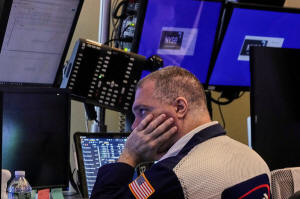Wall Street ends mixed after the Fed says it's still waiting to see the
effects of Trump's tariffs
[June 19, 2025] By
STAN CHOE
NEW YORK (AP) — U.S. stocks drifted to a mixed finish on Wednesday after
the Federal Reserve indicated it may cut interest rates twice this year,
though it’s far from certain about that.
The S&P 500 finished nearly unchanged and edged down by less than 0.1%
after flipping between modest gains and losses several times. The Dow
Jones Industrial Average dipped 44 points, or 0.1%, and the Nasdaq
composite rose 0.1%.
Treasury yields also wavered but ultimately held relatively steady after
the Fed released a set of projections showing the median official
expects to cut the federal funds rate twice by the end of 2025. That’s
the same number they were projecting three months ago, and it helped
calm worries a bit that inflation caused by President Donald Trump’s
tariffs could tie the Fed’s hands.
Cuts in rates would make mortgages, credit-card payments and other loans
cheaper for U.S. households and businesses, which in turn could
strengthen the overall economy. But they could likewise fan inflation
higher.
So far, inflation has remained relatively tame, and it’s near the Fed’s
target of 2%. But economists have been warning it may take months to
feel the effects of tariffs. And inflation has been feeling upward
pressure recently from a spurt in oil prices because of Israel’s
fighting with Iran.
Fed Chair Jerome Powell stressed on Wednesday that all the uncertainty
surrounding tariffs means the median forecast for two cuts to interest
rates this year could end up being far from reality. “Right now it’s
just a forecast in a very foggy time,” he said

Fed officials are waiting to see how big Trump’s tariffs will ultimately
be, what they will affect and whether they will drive a one-time
increase to inflation or something more dangerous. There is also still
deep uncertainty about how much tariffs will grind down on the economy’s
growth.
“Because the economy is still solid, we can take the time to actually
see what’s going to happen,” Powell said.
“We’ll make smarter and better decisions if we just wait a couple months
or however long it takes to get a sense of really what is going to be
the passthrough of inflation and what are going to be the effects on
spending and hiring and all those things.”
Adding to the uncertainty Wednesday were continued swings for oil
prices. After topping $74 during the morning, the price for a barrel of
benchmark U.S. oil dropped below $72 before settling at $75.14, up 0.4%
from the day before. Brent crude, the international standard, rose 0.3%
to $76.70.
[to top of second column] |

Trader Robert Gasparino works on the floor of the New York Stock
Exchange, Tuesday, June 10, 2025. (AP Photo/Richard Drew)
 Oil prices have been yo-yoing for
days because of rising and ebbing fears that the conflict between
Israel and Iran could disrupt the global flow of crude. Not only is
Iran a major producer of oil, it also sits on the narrow Strait of
Hormuz, through which much of the world’s crude passes.
Trump said on Wednesday that Iran has reached out to him and that
it’s not “too late” for Iran to give up its nuclear program, though
he also declined to say whether the U.S. military would strike the
country.
“I may do it. I may not do it,” he said. “I mean, nobody knows what
I’m going to do.”
On Wall Street, Nucor rose 3.3% after the steelmaker said it expects
to report growth in profit for all three of its operating groups in
the second quarter. It said it benefited from higher selling prices
at its sheet and plate mills, among other things.
All told, the S&P 500 fell 1.85 points to 5,980.87. The Dow Jones
Industrial Average dipped 44.14 to 42,171.66, and the Nasdaq
composite added 25.18 to 19,546.27.
In the bond market, Treasury yields held relatively steady following
a few wavers up and down.
The yield on the 10-year Treasury edged down to 4.38% from 4.39%
late Tuesday. The two-year Treasury yield, which more closely tracks
expectations for what the Fed will do with its overnight interest
rate, held at 3.94%.
The moves followed a mixed set of reports on the U.S. economy
released earlier in the day. One said fewer workers applied for
unemployment benefits last week, which could be an indication of
fewer layoffs. But a second report said that homebuilders broke
ground on fewer homes last month than economists expected. That
could be a sign that higher mortgage rates are chilling the
industry.
In stock markets abroad, indexes were mixed across Europe and Asia.
Tokyo’s Nikkei 225 rose 0.9%, and Hong Kong’s Hang Seng fell 1.1%
for two of the bigger moves.
___
AP Writer Jiang Junzhe contributed.
All contents © copyright 2025 Associated Press. All rights reserved |